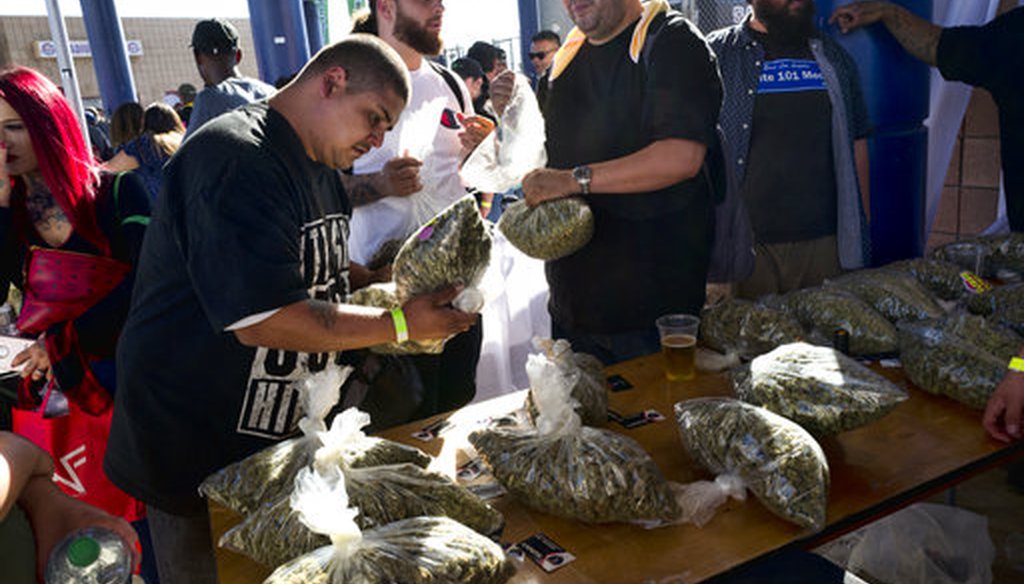Get PolitiFact in your inbox.

In this Saturday, Oct. 20, 2018 photo a customers survey a selection of marijuana in large plastic bags at the cannabis-themed Kushstock Festival at Adelanto, Calif. (AP Photo/Richard Vogel)
About two in three Americans now favor marijuana legalization, a record-high measure of public support for a drug the federal government still puts in the same category as LSD and heroin.
With a majority of states now permitting legal use in some form, and several states poised to relax their laws this November, we decided to take a graphical look at the country’s most popular illicit drug.
Experts pointed to a number of reasons to explain the dramatic shift in Americans’ opinion of marijuana legalization over a relatively short timespan.
California’s 1996 vote to legalize medical marijuana is considered a watershed moment.
"It removed the most formidable barrier: wholesale illegality," said Daniel Medwed, a law professor at Northeastern University. "I think that paved the way to taking a closer look at legalization more broadly."
As legalization begat more legalization, the stigma around marijuana lessened, said Sam Kamin, a law professor at the University of Denver, who teaches courses on marijuana law and policy and who served as a consultant to Colorado and California during their legalization efforts.
Kamin drew historical parallels between the growing social acceptance of marijuana use and the push for gay rights. Acceptance grew as people increasingly found they had friends or family members who identified with each of these movements, he said.
"The medical marijuana movement provided a comforting plot line," said Jeffrey Miron, an economics professor at Harvard University. (Opponents of legal pot say medical marijuana was a ruse to creep closer to full legalization.)
Over time, the legalization strategy found more success by shifting its focus to states rather than Congress, Miron added.
Justin Strekal, the political director of the pro-marijuana advocacy group the National Organization for the Reform of Marijuana Laws, or NORML, said technology helped mobilize a change in attitudes, too. The Internet gave people access to information that ran counter to what he described as decades of government propaganda about pot.
Medwed suggested that growing concerns about the opioid epidemic may have improved marijuana’s image.
"Marijuana is often seen as a more benign, less addictive pain relief alternative to opioids," he said. "Lots of folks who wouldn’t qualify for medical marijuana categorization might jump at the chance to buy marijuana legally, and that could possibly reduce reliance on opioids."
An increased focus on the racial disparity of marijuana law enforcement (which we’ll get to in a bit) have also helped the marijuana legalization movement, though it is hardly the main driver.
American laws around marijuana are complicated.
Not only is marijuana illegal under federal law, but it's still classified as harmful. As a Schedule I drug, the federal government’s official position is that marijuana has "a high potential for abuse" and "no currently accepted medical use."
Yet the past decade has seen a majority of states allow patients suffering from cancer, epilepsy and other ailments to turn to the drug to alleviate symptoms. Nine states and the District of Columbia have gone further by legalizing the recreational use of marijuana.
"In the story of marijuana legalization," said Strekal of NORML, "among the biggest plot points would be Colorado and Washington voting in 2012 for adult use programs."
Here’s a look at the patchwork of state marijuana laws across the country (which may change after midterm voting in November). Nine states and the District of Columbia have legalized marijuana, 31 states and D.C. have okayed medical use, and 16 more have approved limited medical use.
Taxing marijuana can yield a large pot of money for states. The data is still somewhat scarce given that legalization is still in its infancy. Here’s a look at how some of the early adopters have fared:
State
2014
2015
2016
2017
$68
$130
$194
$247
$65
$186
$315
$21
$70
Millions of dollars
*Includes revenue from licenses and fees
In 2016, the Tax Foundation estimated that states would potentially reap billions in tax revenue if they moved to a legalize-and-tax regime. (A separate Tax Foundation analysis looked at potential federal revenues.)
Here’s what the state-by-state breakdown would look like if a 20 percent sales tax were applied across the board, and the pot demand in Colorado and Washington held steady for the rest of the country:
While the sum total looks big, individual states are not getting rich off marijuana taxes, said Kamin.
"It’s not like oil and gas," he said. "It’s a small fraction of a percent of the total budget in Colorado."
Taxes on marijuana can work a bit like a double-edged sword: If they’re set too low, a state leaves money on the table; too high, and the black market may present the more attractive option.
"The most important thing is to get the price point right, including the taxation piece," said Hadar Aviram, a law professor at University of California, Hastings. "There should be a careful balance between state revenue and the affordability of the product, otherwise people shop in the street."
The country’s decades-long crackdown on drugs has had a disproportionate impact on minorities.
A comprehensive 2013 analysis by the ACLU found that while whites and blacks used marijuana at nearly the same rates, blacks were nearly four times more likely to be arrested for pot than whites:
The unequal application of marijuana law enforcement is even more stark in certain urban areas. For instance, we previously found that New York City’s black and Latino populations are arrested at 10 times the rate of white people for virtually the same rate of marijuana usage.
"The war on drugs has disproportionately affected people of color," Medwed said, "ravaging many majority-minority neighborhoods."
A growing awareness of marijuana’s disparate impact on minorities has given the legalization movement a shot in the arm. But it’s not the driving force, experts said.
"Yes, there's great disparity in marijuana law enforcement," said Marc Mauer, the executive director of the Sentencing Project. "But there also is for crack cocaine enforcement, and few people are advocating legalizing that drug."
Miron, of Harvard, said the impact of drug prohibition broadly is terrible for minority communities, but added, "I am not sure that is what affected attitudes of ‘soccer moms.’ "
Kevin Sabet, president of the anti-legalization group Smart Approaches to Marijuana, said legalization has not resolved the drug war’s racial injustice.
"African Americans are twice as likely to be arrested for marijuana in Colorado and Washington," he said, citing a 2016 study. "Both states have legalized recreational use and sales."
Some experts said the pros of legalization far outweighed the cons, while others said it’s too early to tell.
Among the chief concerns were studies suggesting that marijuana legalization is linked to an increase in traffic accidents.
"Road safety is pretty much the only reasonable, science-backed argument against legalization," Aviram said.
A widely-cited analysis from the Insurance Institute for Highway Safety found that crashes are up by as much as 6 percent in Colorado, Nevada, Oregon and Washington, when compared to neighboring states that haven’t made recreational pot legal:
The study’s authors noted that it’s more difficult to determine marijuana's role in crashes than alcohol, and that it’s difficult to isolate a drug’s effects when a driver is found to have consumed a combination of drugs and alcohol.
Experts noted that the data on pot-related accidents is still preliminary and not enough to call a strong finding yet. Still, many agreed the concerns about impaired driving were legitimate.
One concern about the rapid pace of legalization is the lack of research on marijuana’s effects. That’s due largely to government restrictions on conducting experiments with illegal substances.
"There is simply a dearth of information about the short and long-term effects of marijuana use," said Medwed. "That means legalization might represent a ‘real-time’ experiment, with consumers effectively serving as guinea pigs, especially with respect to long-term impacts."
While Marijuana has never killed anyone from an overdose, its potential negative health consequences warrant further study, experts said, with some noting that marijuana potency has risen over time.
Studies show marijuana use is associated with increased likelihood of substance use disorders, and at least one study strongly suggests daily use by teens inhibits brain development concerning judgment. While low doses of marijuana’s active ingredient, THC, have been shown to decrease anxiety, higher doses have been shown to increase anxiety.
"One issue frequently raised is whether there will be an increase in use in vulnerable populations, particularly teens and pregnant women," Mauer said, "though reform advocates contend that marijuana is easy enough to acquire now that there may not be much difference in practice."
<a href="https://www.sharethefacts.co/share/78d54f89-2726-446e-a280-59bf7aa01fad">https://www.sharethefacts.co/share/78d54f89-2726-446e-a280-59bf7aa01fad</a>
Our Sources
Pew Research Foundation, "About six-in-ten Americans support marijuana legalization," Oct. 8, 2018
Gallup, "Two in Three Americans Now Support Legalizing Marijuana," Oct. 22, 2018
Ballotpedia, "Marijuana on the ballot"
Tax Foundation, "Marijuana Legalization and Taxes: Lessons for Other States from Colorado and Washington," May 12, 2016
National Conference of State Legislatures, "Marijuana Overview"
ACLU, "The War on Marijuana in Black and White," June 2013
Insurance Institute for Highway Safety, "Legal Pot: Crashes are up in states with retail sales," Oct. 18, 2018
Email interview with Daniel Medwed, a law professor at Northeastern University, Oct. 23, 2018
Email interview with Sam Kamin, a law professor at the University of Denver, Oct. 23, 2018
Email interview with Jeffrey Miron, an economics professor at Harvard University, Oct. 23, 2018
Email interview with Justin Strekal, the political director of the National Organization for the Reform of Marijuana Laws, Oct. 23, 2018
Email interview with Marc Mauer, the executive director of the Sentencing Project, Oct. 23, 2018
Email interview with Kevin Sabet, president of Smart Approaches to Marijuana, Oct. 23, 2018
Email interview with Hadar Aviram, a law professor at University of California, Hastings, Oct. 23, 2018
Email interview with Kevin Haggerty, a professor at the University of Washington, Oct. 23, 2018
Email interview with Jag Davies, director of communications strategy at the Drug Policy Alliance, Oct. 23, 2018
Email interview with William Rorabaugh, a professor of history at the University of Washington, Seattle, Oct. 23, 2018
Email interview with Marsha Cohen, a law professor at the University of California, Hastings, Oct. 23, 2018










































